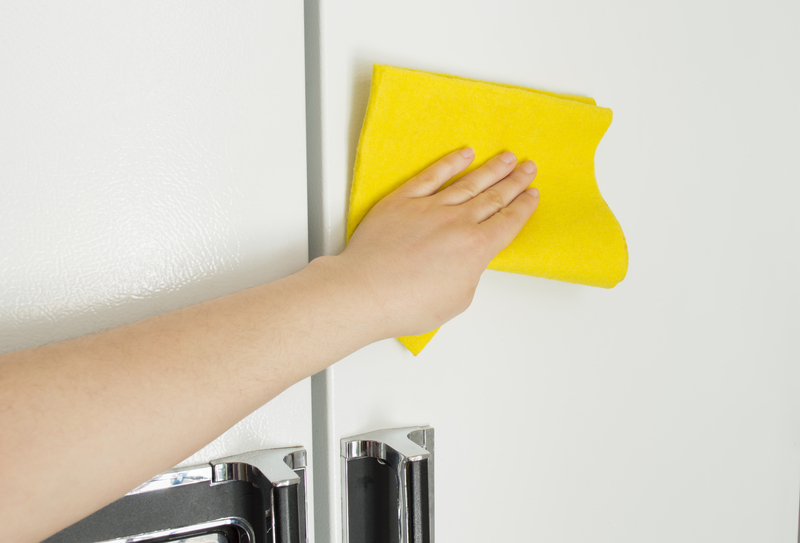Basics of Oven Cleaning
Posted on 03/08/2024
Oven cleaning is an essential household task that not only keeps your kitchen looking tidy but also ensures your oven operates efficiently. Over time, food spills, grease, and grime can accumulate, affecting the oven's performance and potentially posing health risks. This article delves into the basics of oven cleaning, discussing methods, tips, and the importance of maintaining a clean oven.
Why Regular Oven Cleaning is Important
Regular oven cleaning offers several benefits, including improved performance, energy efficiency, and longevity of the appliance. A clean oven heats up more quickly and maintains a stable temperature, which helps in cooking food more evenly. Additionally, removing built-up grease reduces the risk of fire hazards.

Essential Materials for Oven Cleaning
Gathering the right materials before you begin cleaning is crucial for effective results. Here are some commonly used items:
- Baking soda
- White vinegar
- Dish soap
- Soft cloth or sponge
- Rubber gloves
- A scraper or spatula
Step-by-Step Guide to Cleaning Your Oven
1. Preparation: Begin by removing any oven racks and soaking them in warm, soapy water. This will loosen any baked-on grime, making it easier to scrub off later.
2. Create a Cleaning Mixture: In a bowl, mix a few tablespoons of baking soda with water to create a thick paste.
3. Apply the Paste: Spread the baking soda paste evenly across the interior surfaces of the oven, avoiding the heating elements. Let it sit for several hours, preferably overnight, to allow the mixture to break down the grease and grime.
4. Wipe Down: Using a damp cloth or sponge, wipe away the baking soda paste, removing as much of the dissolved grime as possible.
5. Spray Vinegar: Fill a spray bottle with white vinegar and spray it over the oven's surfaces. The vinegar will react with any remaining baking soda, creating a foamy substance that is easy to wipe away.
6. Rinse & Polish: Use a clean, damp cloth to wipe down the oven's interior, ensuring there is no residue left. Follow up with a dry cloth to give it a nice polish.
Alternative Oven Cleaning Methods
If you prefer not to use baking soda and vinegar, there are other methods to consider:
- Commercial Oven Cleaners: These products contain strong chemicals that break down tough stains quickly. However, they require good ventilation and gloves during use due to their harsh nature.
- Self-Cleaning Function: Many modern ovens come with a self-cleaning feature that uses high temperatures to burn off grime. Although convenient, it's important to remove large food debris beforehand to avoid excessive smoke and potential fire hazards.
Tips for Maintaining a Clean Oven
1. Clean Spills Promptly: Wipe up any spills as soon as the oven cools down to prevent them from hardening.
2. Use Oven Liners: Place an oven liner at the bottom to catch drips and crumbs, making cleaning easier.
3. Regular Light Cleanings: Perform a quick clean every month to avoid the buildup of grime.
4. Avoid Abrasive Materials: Use non-abrasive sponges or cloths to prevent scratching the oven surfaces.
Pros and Cons of Cleaning Methods
Pros of Baking Soda and Vinegar:
- Natural, non-toxic ingredients
- Affordable and readily available
- Gentle on oven surfaces
Cons of Baking Soda and Vinegar:
- Requires more time and effort
- May need multiple applications for heavy buildups
Pros of Commercial Cleaners:
- Quick and effective
- Less physical effort
Cons of Commercial Cleaners:
- Contains harsh chemicals
- Can be expensive
- Requires good ventilation

Takeaways
Keeping your oven clean is vital for its efficiency and safety. Whether you use natural cleaners like baking soda and vinegar or opt for commercial products, regular maintenance is key. By following simple tips and cleaning regularly, you can ensure your oven remains in top condition.
Conclusion
Oven cleaning may not be the most enjoyable household chore, but it is undoubtedly necessary. By understanding the basics and implementing regular upkeep, you can extend your oven's lifespan, improve its performance, and maintain a cleaner kitchen environment. Whether you prefer natural methods or commercial cleaners, the important part is consistency in maintenance. Happy cleaning!
Latest Posts
The Benefits of Outsourcing Your End-of-Lease Cleaning Needs






